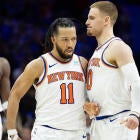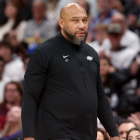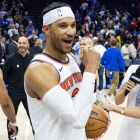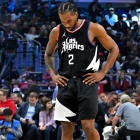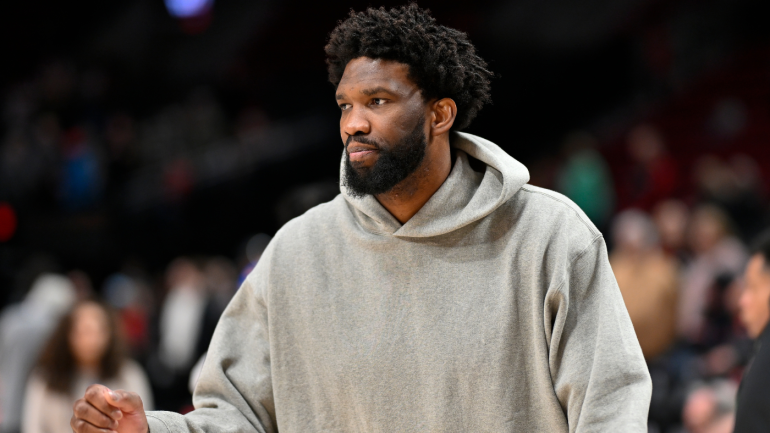
There is a growing and unifying frustration across the NBA centered on the league's requirement, new this season, that players must play in at least 65 games to qualify for end-of-season awards and honors.
Well-regarded hoops journalists have made compelling arguments against the requirement. Rising stars like Tyrese Haliburton, hoping to get cash in on their emerging greatness, have called it "stupid." Draymond Green cited it as a primary reason reigning MVP Joel Embiid now faces a potentially lengthy injury absence after injuring his meniscus on Tuesday.
All reasonable perspectives.
And to which I would suggest: Get used to it.
Perhaps the groundswell of frustration and doubt about the rule's effects will change things. Perhaps Embiid's historic season, if it continues and he plays fewer than 65 games but near enough to raise the temperature further on this topic, will engender a change-of-heart at the league offices in New York City.
But I doubt it.
The plan, from the NBA's perspective, has worked. They'd tell you it has effectively shifted players sitting out, including this claim: That 71% of star players — All-Stars or All-NBA players from the past three three seasons — are on track to play 65 or more games this season, up from 47% at this time last year.
They'd also say stars should play, and this policy has helped make that happen. And they'd argue, despite the recent blowback, that this is just what the league needs.
Kawhi Leonard, for example, is already approaching as many games played as last season, and the most since his San Antonio days. Not coincidentally, the Clippers are a force, and must-watch TV for many fans.
There has been a strange shift, right or wrong, this century, from Kobe Bryant's tough-as-nails philosophy that, among other things, meant you played when you could, to today's tendency for players to regularly miss time.
The NBA pushing back was inevitable. And some bad press isn't going to sway them off course.
Take last season. Embiid won the Most Valuable Player award after playing just 66 games, the second-fewest in NBA history for an MVP winner. Giannis Antetokounmpo — the player I voted for last season for MVP — played just 63. Nikola Jokic, who I probably should have voted for, played in 69.
The All-NBA Team accolades also went to guys who saw, historically speaking, limited action. On top of Giannis, Embiid and Jokic, there were first-team players Luka Doncic (66 games) and Shai Gilgeous-Alexander (68) who would be close to that threshold this season.
The All-NBA second team saw Jimmy Butler (64), Jaylen Brown (67), Donovan Mitchell (68) and Steph Curry (56) come under the 70-games-played mark. The third team, too, had guys like LeBron James (55) and Damian Lillard (58) who played fewer than 60.
That's 11 of the 15 All-NBA players who played in fewer than 70 games.
This is a problem.
And it's a shift that tracks back to LeBron, a player whose basketball IQ is as high as his natural skills are overwhelming. While in Miami, he studied Gregg Popovich, the Spurs and their early-on tendency to load manage. He saw first hand how effective a rested team could be in 2014, when a Spurs team that did not have a single player who averaged at least 30 minutes per game beat his Miami Heat in the NBA Finals.
And then LeBron started to apply that approach, learning as he aged how to pace himself, when to sit, how to try and push back against the head coaches who couldn't help but pile on the minute when The King was out there.
This is a copycat league, and after LeBron James cranked out 82 games played in the 2017-18 season only to get swept by the Warriors in the Finals, something changed. He hasn't hit the 70 mark since.
And other players followed suit.
The league saw NBA fans too often not getting enough NBA stars on game nights, yes. But they surely also saw a pattern emerging, perhaps long term and eventually intractable, of great players sitting, again and again, building a culture of rest taking hold in a business ultimately built on the best and brightest playing as often as possible.
They can't want young players to think this is how you structure an NBA career – by playing here and there. They do not want a game watered down by this pattern. And I would imagine, regardless of the optics and the frustration and the image of a battered Embiid supposedly mauled by this policy, that they won't flinch now.
The NBA In-Season tournament was not a beloved idea, but it worked. And this 65-game policy, too, will be seen in Adam Silver's orbit as one that is right, one that will ultimately work, and one with similar eyes to other bold moves he's made: With the belief people will come around, the game will be better, and the doubters and narratives supporting them can be waited out.
Is the league right? Perhaps, perhaps not.
But get used to this, everyone. Odds are the 65-game threshold, or something like it, is here to stay.














